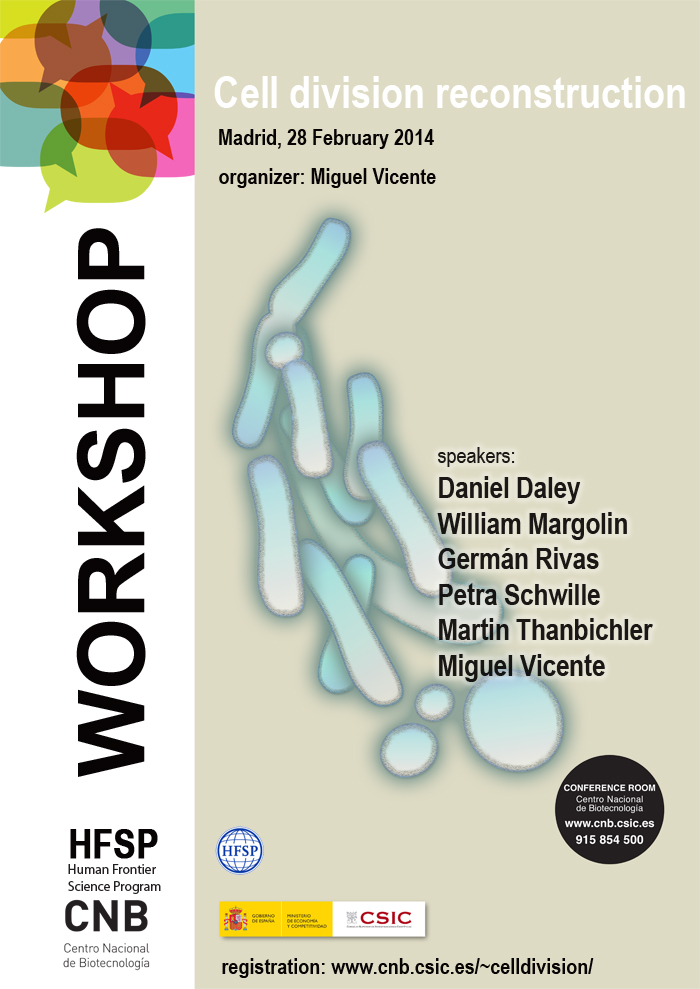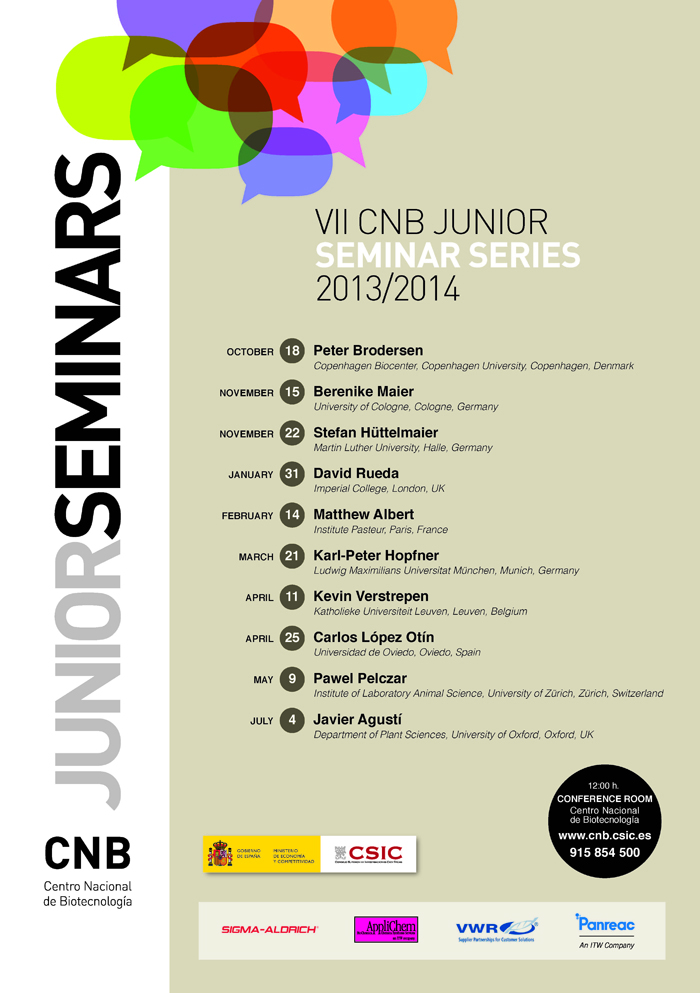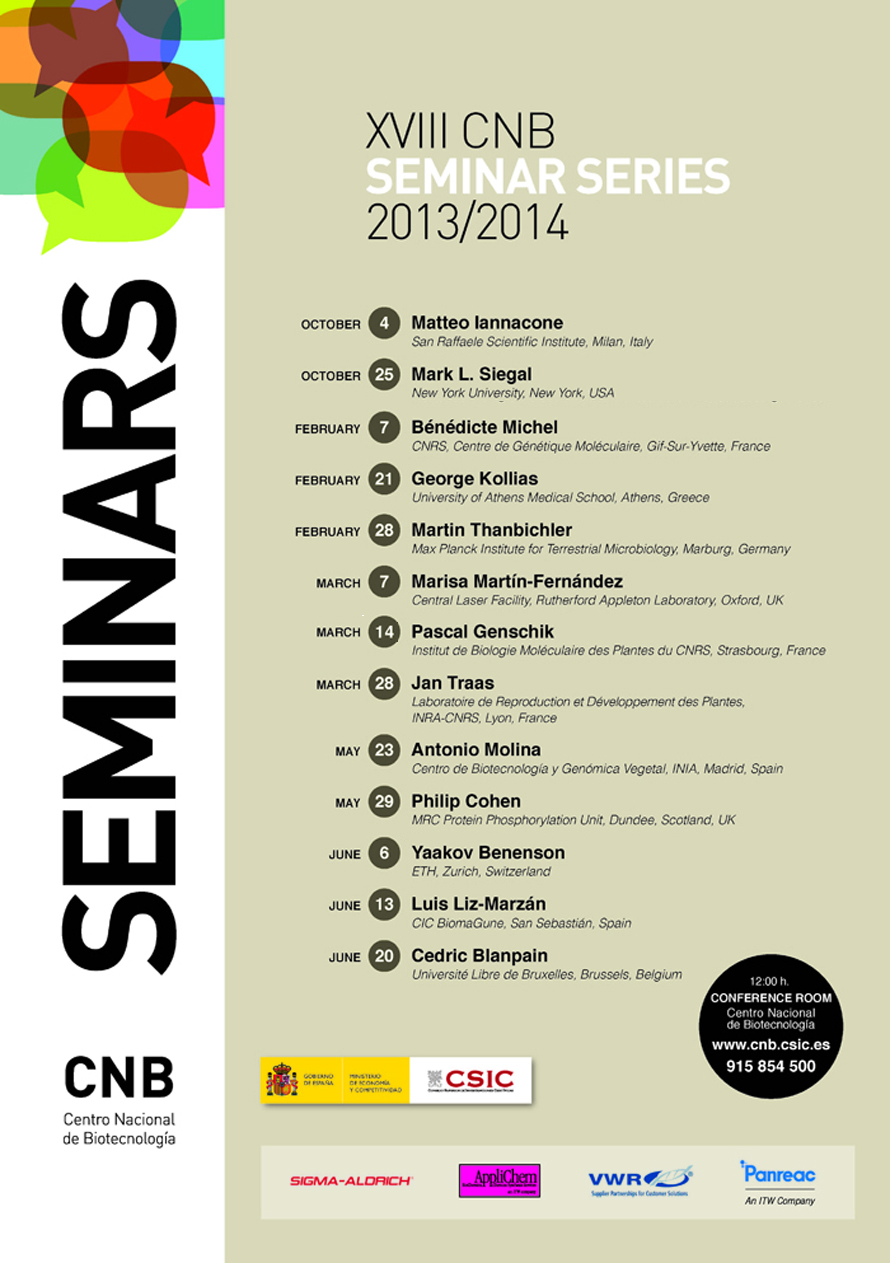
Colloquium on Cellular Decision Making
Many cellular processes can in the end be understood in terms of decisions; should a damaged cell decide to repair or to die? should a virus stay as a lysogen or rather cause host lysis? should a bacteria differentiate or not into a spore state when nutrients become limiting? Recent research is starting to understand these type of decisions by applying quantitative measurements and mathematical modeling. Notably, in many of these scenarios cellular 'strategies' that combined biological noise and nonlinearities in response are starting to be unravelled.
On 24 January 2014, the CNB Systems Biology Programme is bringing a number of experts on these very topics next week as part of its annual colloquium, with talks including aspects of decision making in mammalian cells, plants, microbes, etc. (see programme), so we expect that this meeting could be of interest for a wide range of life sciences scientists. You are all most welcome to attend.
PROGRAMME
Morning Session I (Chairman: Víctor de Lorenzo)
09:45 Welcome and General Information
10:00 - WILFRIED WEBER, University of Freiburg, Germany. Optical Control of Mammalian Cells
10:30 - ALEX DE MENDOZA, EB UPF-CSIC, Spain. Comparative genomics at the origins of multicellularity: transcription factors and signaling systems
11:00 - FRANCISCO ROMERO-CAMPERO, University of Seville, Spain. Plant development evolution based on gene co-expression networks
11:30 Coffee Break
Morning Session II (Chairman: Juan F Poyatos)
12:00 - PETER SWAIN, University of Edinburgh, UK. Microbial decision-making: phosphorylations and mating in yeast
12:30 - THIERRY EMONET, Yale University, USA. Functional trade-offs and phenotypic diversity in cellular migration
13:00 – EDO KUSSELL, New York University, USA. Memory accelerates bacterial adaptation in fluctuating environments
13:30 Lunch
Afternoon Session I (Chairman: Florencio Pazos)
14:30 - FERNANDO CASARES, CABD (CSIC-U. Pablo de Olavide), Spain. Gene Network Wiring and Eye Architectures in Drosophila
15:00 - CARSTEN PETERSON, Lund University, Sweden. Transcriptional regulation of lineage commitment in hematopoiesis - a stochastic model of cell fate decision
15:30 - NADIA MERCADER, CNIC, Spain. Cardiac regeneration vs. fibrotic repair: learning from the zebrafish
16:00 Coffee Break
Afternoon Session II Chairman: (Javier Tamames)
16:30 - MARTIN ACKERMANN, ETH, Switzerland. An Evolutionary Perspective on Bacterial Individuality
17:00 General Discussion and Conclusions
VIII Reunión de la Red de Estructura y Función de Proteínas
Del 2 al 4 de abril de 2014 se va a celebrar en el Centro Nacional de Biotecnología del CSIC (CNB) VIII Reunión de la Red Nacional de Estructura y Función de Proteínas.
 Organizada por los científicos del CNB José María Valpuesta y José L. Carrascosa, la reunión pretende reunir a gran parte de la comunidad científica española que estudia distintos aspectos de las proteínas, para intercambiar conocimientos y fomentar colaboraciones. En esta reunión seguirá el formato de las anteriores, con charlas cortas que permitan mostrar los resultados al mayor número posible de investigadores, dando preferencia para las charlas a investigadores junior.
Organizada por los científicos del CNB José María Valpuesta y José L. Carrascosa, la reunión pretende reunir a gran parte de la comunidad científica española que estudia distintos aspectos de las proteínas, para intercambiar conocimientos y fomentar colaboraciones. En esta reunión seguirá el formato de las anteriores, con charlas cortas que permitan mostrar los resultados al mayor número posible de investigadores, dando preferencia para las charlas a investigadores junior.
Para la organización de la reunión se cuenta con la ayuda del Ministerio de Economía y Competitividad y con apoyo por parte del Centro Nacional de Biotecnología y de varias sociedades científicas (SEBBM y SME) y empresas colaboradoras de la Red (Bruker, Sigma-Aldrich y Diffractia). Todo ello ha permitido la invitación de varios científicos que abrirán los simposios de la Reunión (ver Programa provisional).
La asistencia a la reunión será por cuenta de los investigadores participantes, tal como ha ocurrido en anteriores eventos, aunque habrá un número de ayudas a la asistencia para investigadores, financiadas por distintas sociedades científicas, cuyo número y cuantía está aun por determinar.

XXI Jornadas Científicas del CNB
La vigésima primera edición de las tradicionals Jornadas Científicas del CNB se celebrará este año los días 17 y 18 de diciembre de 2013. Como se puede apreciar en el programa, 23 científicos del CNB explicarán sus investigaciones, siendo una magnífica oportunidad de ponerse al día de las investigaciones que se llevan a cabo en la actualidad en el campo de las ciencias de la vida.
Como en años anteriores, desde el 9 de diciembre, se desarrolla en paralelo una sesión de pósters en la que los estudiantes de doctorado muestran sus trabajos. Tras la sesión presencial del jueves 12 de 11:00 a 13:00, se elegirán los dos mejores que darán una charla en la última sesión del miércoles 18 de diciembre.
PROGRAMA
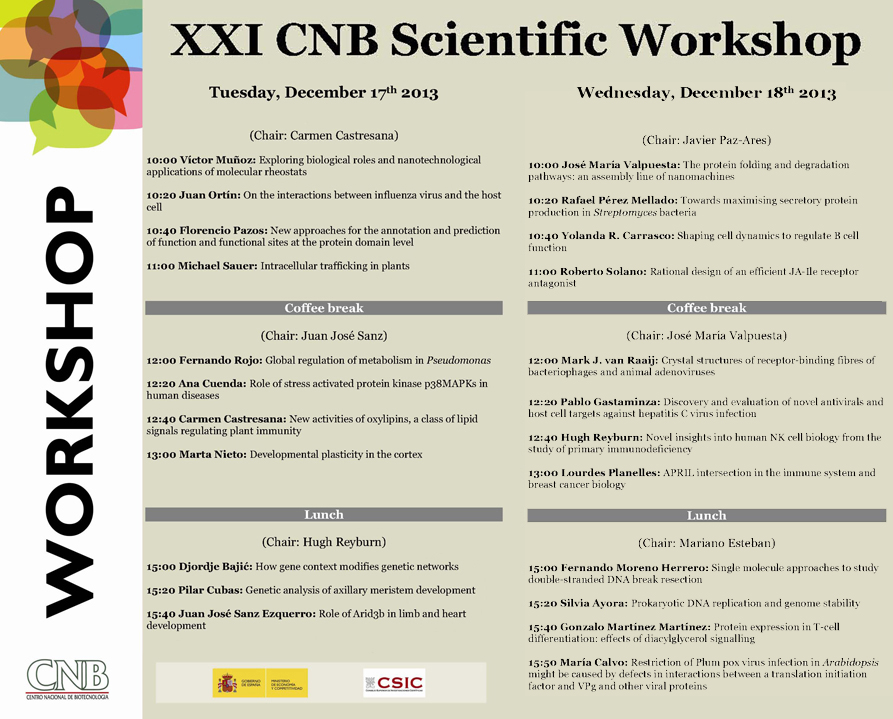
Cell Division Reconstruction workshop
Packing bacterial components in unusual containers allows to explore how complex machineries work without the limitations imposed when using the whole cell. This approach, central to Miguel Vicente's HFSP grant, has produced valuable information on the cell division machinery, the divisome. New interactions between elements of the machinery have been revealed and functional assemblies have been reconstructed in the test tube.
On 28 February 2014 they will summarize the results of their project and discuss future Synthetic Biology developments in this field during a one day workshop at the Spanish National Centre for Biotechnology in Madrid. For more information and registration please visit the workshop's website.
PROGRAMME
10:00 Registration
10:30 - PETRA SCHWILLE. The contractile ring - facts and fiction
11:15 - WILLIAM MARGOLIN. Inhibiting the proto-ring, from A to Z
12:00 - MARTIN THANBICHLER. Mechanisms of MipZ-mediated division control in Caulobacter crescentus
13:15 Lunch
14:30 - MIGUEL VICENTE. Divisome adventures in maxicells
15:15 - GERMÁN RIVAS. Biochemical reconstruction of bacterial division in minimal systems
16:00 - DANIEL DALEY. The final stages of cell division in Escherichia coli: What happens and when?
XXI Workshop Avances en Biología Molecular por Jóvenes Investigadores en el Extranjero
El Centro Nacional de Biotecnología del CSIC celebra en Madrid el jueves 19 de diciembre de 2013 la vigesimoprimera edición de su tradicional jornada Avances en Biología Molecular por Jóvenes Investigadores en el Extranjero.
Las jornadas incluyen este año una mesa redonda en la que se comentarán las distintas posibilidades de financiación a nivel europeo.
PROGRAMA
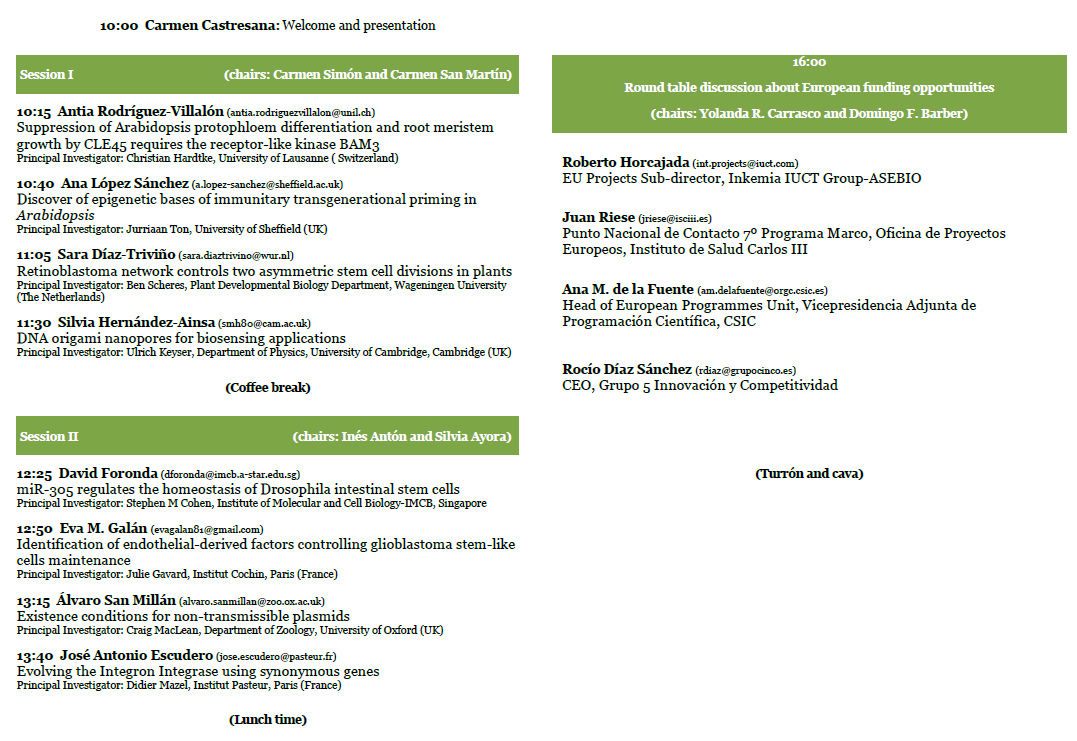
Semana de la Ciencia 2013
Como el resto de centros del CSIC, el CNB participa activamente en la Semana de la Ciencia y la Tecnología, un hito anual de divulgación científica que se celebra en España desde 2001.
Estas son las actividades de este año en las que participan los investigadores del CNB:
- 5 de noviembre de 2013 (9:30 - 12:00). Visita guiada al CNB.
- 5 de noviembre de 2013 (12:00). El Puzzle del Cerebro. Charla divulgativa a cargo de Rosario Fernández.
- 12 de noviembre de 2013 (9:30 - 12:00). Visita guiada al CNB.
- 14 de noviembre de 2013 (15:30 - 17:00). Visita guiada al CNB.
- 14 de noviembre de 2013 (17:00). ¿Puede la Biotecnología curar las Enfermedades Raras? Mesa redonda con la participación de Lluís Montoliu

Patentadas en EE.UU. bacterias capaces de inyectar anticuerpos
Investigadores del Centro Nacional de Biotecnología del CSIC (CNB) han obtenido una patente en los Estados Unidos que les permite utilizar bacterias no patógenas como si de jeringuillas microscópicas se trataran.
Las bacterias modificadas tienen en su membrana unas proteínas a modo de jeringuilla con las que son capaces de inyectar anticuerpos de pequeño tamaño (nanoanticuerpos) y otras proteínas con potencial terapéutico (p.ej. enzimas) a células humanas, evitando de esta manera la barrera que representa la membrana plasmática de la célula. En el caso de usar nanoanticuerpos, estos se podrían unir dentro de la célula a una proteína diana que participase en un proceso patológico para inactivar su función.
Para comprobar la viabilidad de esta tecnología, el grupo dirigido en el CNB por el Dr. Luis Ángel Fernández, introdujo estos nanoanticuerpos en el citoplasma de células humanas demonstrando que se unían especificamente a su proteína diana.
Una de las principales ventajas de este sistema es que la producción de los nanoanticuerpos la realiza la propia bacteria de manera continua, lo que podría reducir el coste y el número de dosis necesario para administrar estos anticuerpos de forma efectiva. Fernández recalca además su seguridad, ya que la inyección de los anticuerpos por parte de E. coli no conlleva ni la invasión de la células por parte de las bacterias ni la transferencia de manterial genético, al contrario que lo que ocurre con virus modificados.
El objetivo actual de este grupo de investigación es combinar estas jeringas moleculares en bacterias "probióticas" con nuevas modificaciones de forma que actuasen en el intestino y otras mucosas del organismo como autenticos "microrobots" dirigidos tanto para la detección como el tratamiento in situ de lesiones de tipo inflamatorio o tumoral.
- Luis Ángel Fernández y Ana Blanco-Toribio. Una bacteria recombinante capaz de inyectar anticuerpos monodomino intracelularmente en células humanas. Ref. CSIC/AH_015.
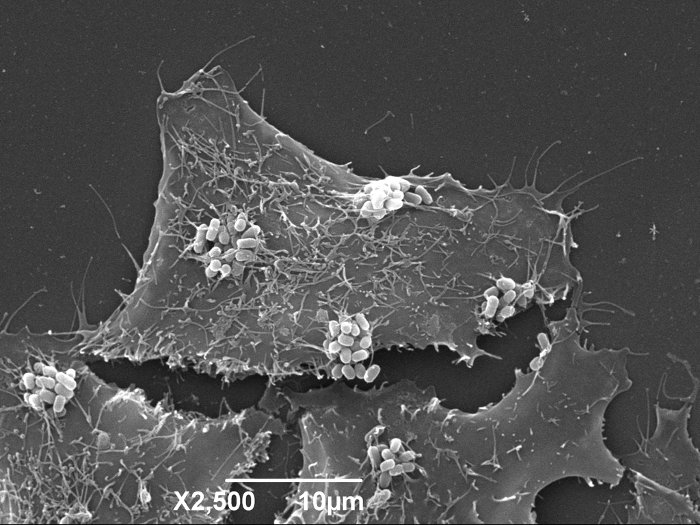
Chromatography for Proteomics [CANCELLED]
THIS COURSE HAS BEEN CANCELLED.
Organised by the EuPA Education Committee, Proteored-ISCIII and the Spanish Proteomics Society, from 4 to 8 Novembre 2013 the basic course Chromatography for Proteomics will be held in Madrid at the National Centre for Biotechnology-CSIC and the Faculty of Pharmacy-UCM.
In accordance with the HUPO/EuPA guidelines, the course aim to
- Provide a theoretical basis for understanding chromatographic separations
- Illustrate how the techniques are being applied in modern proteomics studies
- Help students to design their own experiments
- Provide practical instruction in laboratory techniques
- Provide extensive tutorial/discussion sessions
Course Description:
There are two main separation methods used in modern proteomics, electrophoresis and chromatography. The course is part of a series designed to give researchers a thorough basis to understand the new trends in protein expression analysis and to enable scientists entering the field to evaluate how useful these new techniques are to their own research and how to apply them effectively.
Theoretical Lectures:
- Basic liquid chromatography terms and theory
- Methods for separating protein and peptide mixtures
- Designing multi-dimensional separations
- Mass Spectrometry and database searching
Practical Classes:
- Sample preparation and extraction
- Evaluating and optimising separations
- Making nanocolumns, plumbing and HPLC troubleshooting
For inscriptions (before 21 September 2013), visit the website of the Chromatography for Proteomics.
VII Ciclo de Seminarios Júnior
XVIII Ciclo de Seminarios del CNB
COOKIES POLICY
A cookie is a text file that is stored on your computer or mobile device via a web server and only that server will be able to retrieve or read the contents of the cookie and allow the Web site remember browser preferences and navigate efficiently. Cookies make the interaction between the user and the website faster and easier.
General information
This Website uses cookies. Cookies are small text files generated by the web pages you visit, which contain the session data that can be useful later in the website. In this way this Web remembers information about your visit, which can facilitate your next visit and make the website more useful.
How do cookies?
Cookies can only store text, usually always anonymous and encrypted. No personal information is ever stored in a cookie, or can be associated with identified or identifiable person.
The data allow this website to keep your information between the pages, and also to discuss how to interact with the website. Cookies are safe because they can only store information that is put there by the browser, which is information the user entered in the browser or included in the page request. You can not run the code and can not be used to access your computer. If a website encrypts cookie data, only the website can read the information.
What types of cookies used?
The cookies used by this website can be distinguished by the following criteria:
1. Types of cookies as the entity that manages:
Depending on who the entity operating the computer or domain where cookies are sent and treat the data obtained, we can distinguish:
- Own cookies: are those that are sent to the user's terminal equipment from a computer or domain managed by the editor itself and from which provides the service requested by the user.
- Third party cookies: these are those that are sent to the user's terminal equipment from a machine or domain that is not managed by the publisher, but by another entity data is obtained through cookies.
In the event that the cookies are installed from a computer or domain managed by the editor itself but the information collected by these is managed by a third party can not be considered as party cookies.
2. Types of cookies as the length of time that remain active:
Depending on the length of time that remain active in the terminal equipment can be distinguished:
- Session cookies: cookies are a type designed to collect and store data while the user accesses a web page. Are usually used to store information that only worth preserving for the service requested by the user at any one time (eg a list of products purchased).
- Persistent cookies: cookies are a type of data which are stored in the terminal and can be accessed and treated for a period defined by the head of the cookie, and can range from a few minutes to several years.
3. Cookies types according to their purpose:
Depending on the purpose for which the data are processed through cookies, we can distinguish between:
- Technical cookies: these are those that allow the user to navigate through a web page or application platform and the use of different options or services it exist as, for example, control traffic and data communication, identify the session, access to restricted access parts, remember the elements of an order, make the buying process an order, make an application for registration or participation in an event, use security features while browsing store content for dissemination videos or sound or share content via social networks.
- Customization cookies: these are those that allow the user to access the service with some general characteristics based on a predefined set of criteria in the user terminal would eg language, the type of browser through which you access the service, the locale from which you access the service, etc.
- Analysis cookies: they are those that allow the responsible for them, monitoring and analyzing the behavior of users of the web sites that are linked. The information gathered through such cookies are used in measuring the activity of web sites, application or platform and for the profiling of user navigation of such sites, applications and platforms, in order to make improvements function data analysis how users use the service.
Management tool cookies
This Website uses Google Analytics.
Google Analytics is a free tool from Google that primarily allows website owners know how users interact with your website. Also, enable cookies in the domain of the site in which you are and uses a set of cookies called "__utma" and "__utmz" to collect information anonymously and reporting of website trends without identifying individual users..
For statistics of use of this website use cookies in order to know the level of recurrence of our visitors and more interesting content. This way we can concentrate our efforts on improving the most visited areas and make the user more easily find what they are looking for. On this site you can use the information from your visit for statistical evaluations and calculations anonymous data and to ensure the continuity of service or to make improvements to their websites. For more details, see the link below privacy policy [http://www.google.com/intl/en/policies/privacy/]
How to manage cookies on your computer: disabling and deleting cookies
All Internet browsers allow you to limit the behavior of a cookie or disable cookies within settings or browser settings. The steps for doing so are different for each browser, you can find instructions in the help menu of your browser.
If you decline the use of cookies, since it is possible thanks to the preferences menu of your browser or settings, reject, this website will continue to function properly without the use of the same.
Can you allow, block or delete cookies installed on your computer by setting your browser options installed on your computer:
- For more information about Internet Explorer click here.
- For more information on Chrome click here.
- For more information about Safari click here.
- For more information about Firefox click here.
Through your browser, you can also view the cookies that are on your computer, and delete them as you see fit. Cookies are text files, you can open and read the contents. The data within them is almost always encrypted with a numeric key corresponding to an Internet session so often has no meaning beyond the website who wrote it.
Informed consent
The use of this website on the other hand, implies that you paid your specific consent to the use of cookies, on the terms and conditions provided in this Cookies Policy, without prejudice to the measures of deactivation and removal of cookies that you can take, and mentioned in the previous section.

